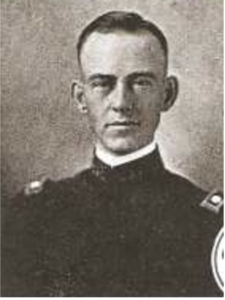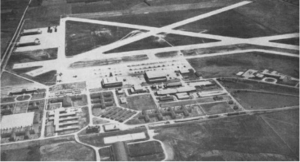Scroll of Honor – James Edward Vernon
A Fitting Day to Die
Written by: Kelly Durham
The 1918 edition of Taps, the Clemson College annual, included a dedication “To those of our class-mates who  have departed their college halls in order to prepare themselves for service in the Army of Democracy.” James Edward Vernon was one of the men to whom the dedication was addressed.
have departed their college halls in order to prepare themselves for service in the Army of Democracy.” James Edward Vernon was one of the men to whom the dedication was addressed.
Vernon, from Spartanburg, was a civil engineering major who found time to participate in many of the activities available on the small, rural campus. He was a member of his class’s dancing clubs, serving as vice president as a senior. As assistant athletics editor of Taps, he helped guide coverage of Clemson’s early intercollegiate sports teams. He was a member of the Hobo Club, the Thalian Society, and the Spartanburg County Club, which he served as president during his senior year. Vernon’s classmates described him as “Being endowed with a good intellect, a remarkable amount of common sense, and a determination that never knows defeat.”
Vernon was awarded his degree with the Class of 1918 despite having already left campus to join in the Great War in France. Over there, Vernon became one of America’s early military aviators reaching the rank of first lieutenant in the Army’s Air Service.
Following the war, Vernon returned to Spartanburg and joined Harwood Beebe, a newly established engineering firm. When America entered the Second World War, Vernon set aside his career and once again answered the call to duty, this time as a lieutenant in the Naval Reserve. Rather than assigning him to sea duty, the Navy utilized Vernon’s engineering expertise and his personal experience as an aviator.
With the surprise attack on Pearl Harbor, the Navy suddenly had urgent need for new training facilities. Thousands of carrier-borne pilots would eventually be needed to drive the Japanese back across the Pacific to their home islands. Vernon was dispatched to the new Naval Air Station at Olathe, Kansas. While it was a long way from the ocean, Olathe was still described by one of its pilot trainees as a sea—of mud. Vernon and his colleagues set about turning the prairie land into a modern, working airfield with all of the operations, maintenance, and training facilities required to support it.
On July 4, 1944, Vernon “died suddenly at his post,” according to a newspaper report. It seemed a fitting date for the passing of this patriotic veteran of two World Wars. At age fifty, Vernon is the oldest Clemson alumnus to die while on active duty during World War II. He was survived by two daughters and a son, then a Navy aviation cadet in Pensacola, Florida.
For more information on Lieutenant James Edward Vernon see:
https://soh.alumni.clemson.edu/scroll/james-edward-vernon/
For additional information on Clemson University’s Scroll of Honor visit:
https://soh.alumni.clemson.edu/

